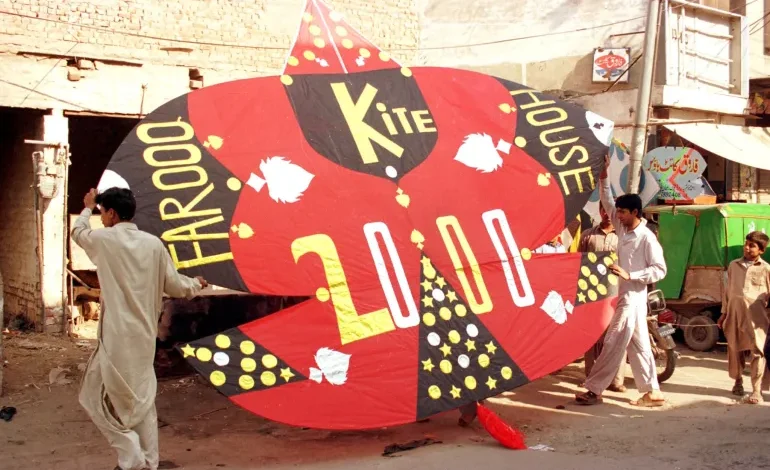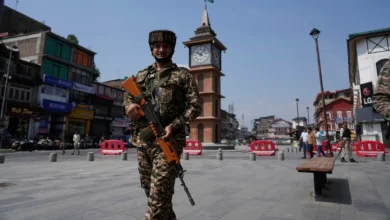Why has Pakistan’s Punjab province imposed a complete ban on kite flying?

Pakistan’s most populous Punjab province has imposed a complete ban on kite flying before the centuries-old Basant festival – which marks the arrival of spring – over public safety concerns.
Legal amendments passed by the provincial assembly impose heavier fines and longer jail terms for violators that were in force previously, in a disappointment to revellers who fly kites as part of an age-old tradition to welcome spring – a celebration that stands for joy, colour and the beauty of nature.
Authorities have defended the latest measure, saying the use of metal and glass-coated strings has caused injuries and even deaths, making kite-flying a danger to public safety.
But critics say the ban is unjust and in disregard to a popular cultural festival celebrated by people of all faiths in the South Asian nation. Some experts suggested that authorities could have regulated the use of dangerous strings instead of an outright ban, which has affected the livelihoods of thousands of kite makers.
What’s the new law that imposes a total ban on kite-flying in Punjab?
The Punjab assembly last month officially passed the Punjab Prohibition of Kite Flying (Amendment) Act, 2024, which introduced enhanced prison terms and heavy fines for kite fliers, manufacturers, transporters and sellers.
The law represents an amendment to the Prohibition of Kite Flying Act, 2007 and has made kite-flying a non-bailable offence.
Under the previous law, individuals caught flying kites could face up to three years in prison or be fined up to 100,000 rupees ($360), or both. Now, they may face up to five years in prison or a two-million rupee ($7,200) fine, or both. If the fine is not paid, an additional year of imprisonment can be added.
Kite makers and transporters can face between five to seven years in prison or a fine of between 500,000 ($1,800) to five million rupees ($18,000), along with an additional two years of imprisonment upon failure to pay the fine. The previous law targeted making, sale and trade of kites, but not the transport of kites and dangerous kite strings.
The law prohibits the transport of “kites, metallic wire, nylon cord, any other thread coated with sharp maanjha [glass-coated string] or any other injurious material for the purpose of kite flying”.The new law also includes specific penalties for minors. The first offence by a minor will result in a warning, and the second offence in a 50,000-rupee ($180) fine. A third offence would attract a 100,000-ruppe ($360) fine, while a fourth offence will lead to imprisonment under the Juvenile Justice System Act 2018, according to a summary posted online by the Punjab police.
Previous laws allowed kite-flying after permission from authorities on certain occasions and attempted to regulate the manufacture, sale, and trading of kites with lesser penalties for violators.
Mujtaba Shuja-ur-Rehman, a legislator from the ruling Pakistan Muslim League party, said the stricter penalties, which will apply across the province, were needed to save the lives of innocent people.
The latest measures took effect before the Basant festival, celebrated on the fifth day of the lunar month of Magha. This year’s spring festival began on February 2, but kite-flying clubs have pledged to defy the ban.
Has Punjab issued curbs on kite flying before?
Yes. The government in Punjab province has issued a series of executive orders and bans to try to crack down on kite flying since the early 2000s, including an emergency law passed in 2001.
In 2005, the Supreme Court of Pakistan directed the Punjab government to regulate the manufacture, trade or even flying of kites in response to an outcry over dozens of injuries and deaths caused every year by the glass, metal-coated or nylon strings.
Punjab’s provincial capital Lahore also imposed a kite-flying ban in 2005 to address what the top court said was a “menace”.
What other actions have authorities taken to discourage kite-flying?
Over the years, penal, judicial as well as legislative measures have failed to prevent the revelers from flying kites.
Authorities have also roped in religious leaders to drive home the point that kite flying is dangerous. Religious scholars in consultation with Lahore police have issued a fatwa, or Islamic edict, declaring kite flying un-Islamic.










